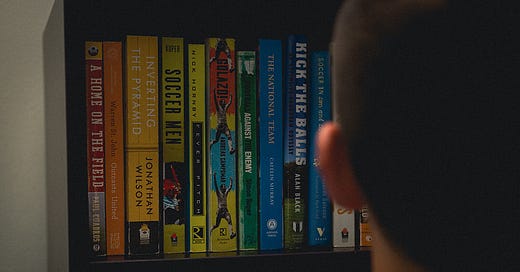'A Pretty Move, for the Love of God!'
Eduardo Galeano's "Soccer in the Sun and Shadow" and COPA90's "Once in a Lifetime" documentary as expressions of the beautiful game's magic.
The ‘Spring Cleaning’ offer to join my exclusive Attic Club for 25% off a yearly subscription expires in three days. Come play with us. If you want to join but can’t spend the cash, write me, and I’ll put you on my monthly comp subscriptions list.
Play has become a spectacle, with few protagonists and many spectators, soccer for watching. And that spectacle has become one of the most profitable businesses in the world, organized not for play but rather to impede it. The technology of professional sport has managed to impose a soccer of lightning speed and brute strength, a soccer that negates joy, kills fantasy, and outlaws daring.
Luckily, on the field, you can still see, even if only once in a long while, some insolent rascal who sets aside the script and commits the blunder of dribbling past the entire opposing side, the referee and the crowed in the stands, all for the carnal delight of embracing the forbidden adventure of freedom.
—Eduardo Galeano, Soccer in Sun and Shadow (1995)
Regardless of how I’ve been involved in the beautiful game over the years, my first love has always been the ball.
When I was still young enough to take a parent’s word for gospel, my dad taught me that I should treat it tenderly, like a beautiful woman. “Not like the English!” he warned me with an outstretched finger. They kick her about and she cries herself to sleep. But the Argentinians, they love her, caress her skin, and take her gently, respectfully, to the only place she ever wishes to be: the back of the opponent’s net.
In this, my dad was right.
I was never a great soccer player. But I’ve dribbled on dirt fields, manicured grass, and indoor turf for most of my life. I’ve made friends with opponents, eternal enemies of referees, and scored a few goals memorable enough to recount when I pass the bottle late at night among friends from parts of the world where soccer is religion.
I met the mother of my children on a soccer field.
Now that the weather’s warming in Knoxville, I’ve been in the driveway, kicking the ball around with the kids and practicing my keepie uppies. After watching the recent round of CONMEBOL qualifiers, in which Argentina humbled Brazil 4-1 at home, I pulled one of my favorite books, Soccer in the Sun and Shadow by Eduardo Galeano, off the shelves to flip through.
Neither a history nor a narrative, in the traditional sense, the Uruguayan’s classic story of soccer’s emergence as the world’s sport is a glossary of the beautiful game. There are sections dedicated to the player, goalkeeper, fan, and manager, as well as the rules of the game, language of war, discovery of America, bicycle kick, and the World Cup.
This is a book you do not summarize. It simply must be read. (You can order it for less than $10 on Amazon, ThriftBooks, or put it on your list to pick up at the local bookstore.)
Memorably, rather than a prelude or introduction, Galeano opens the book with a “confession,” in which he recounts how he’d once dreamed, like every Uruguayan boy, to be a soccer player—until he realized, as so many of us have, that he had wooden legs. He tried being a fan, but he was no good at that either, because he found himself unable to hate the best players on the other team.
And so, he says:
“Years have gone by and I’ve finally learned to accept myself for who I am: a beggar for good soccer. I go about the world, hand outstretched, and in the stadiums I plead: ‘A pretty move, for the love of God.’ And when good soccer happens, I give thanks for the miracle and I don’t give a damn which team or country performs it.”
Fewer miracles are happening on soccer fields today.
The sport is more corporate than ever, more mechanical and boring. In the U.S., your parents must be millionaires or sell all their possessions to pay for a single club soccer season. So it’s no wonder that Eli Mengem, the founder of Copa90, a documentary platform telling the lesser-known stories of the beautiful game, set out during the 2022 World Cup not to Qatar but to the streets of Buenos Aires and Rosario as Argentina made its run to the final.
Copa90’s four-part documentary, Once in a Lifetime, premiered on YouTube for the two-year anniversary of Argentina’s World Cup victory and follows the creator as he meets with regular folks, watches the games in bars and houses, and interviews local journalists, fans, and one of the world’s renowned soccer journalists, Jonathan Wilson, author of Angels with Dirty Faces, a football history of Argentina for the English-speaking world.
Like Galeano’s book, words cannot do it justice. Just watch.
Below, I’ve added some of the many soccer stories I’ve written for Substack over the years. Two are poems: one written for my dad, who taught me the true rules of the game, and another for its purest form, the pick-up. Three others appeared in Big Head on the Block.
If you ever want to dribble a ball or strike up a chat about why the “Hand of God” is actually the most important goal in World Cup history, you know where to find me.
Before you leave, support my work by upgrading to a paid subscription for as little as $4.17/month ($50/year). You can also buy me a coffee, order a copy of my first story collection, or listen to my stories on YouTube and Spotify.





